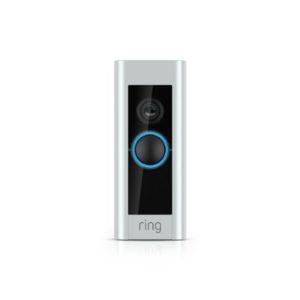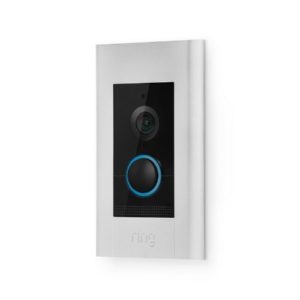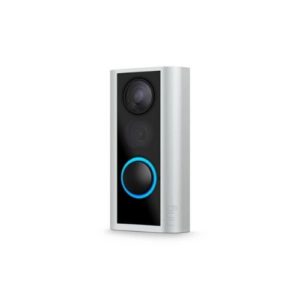Ring Video Doorbell vs. Ring Video Doorbell 2 and More
Of all the Ring video doorbells—from the original to the Elite—our overall pick for Ring Doorbells is the Ring Video Doorbell 2. It’s easy to install, easy to use, and under $200.
It’s pricier than its predecessor, the original Ring Video Doorbell, but its 1080p video quality is a nice step up from the original’s 720p, with slightly better night vision as well. Its power source is another plus—you can hardwire the Ring 2 for continuous power if you want, or you can take advantage of its easy-to-charge, pop-out battery (another upgrade from the original doorbell).
The Ring 2 isn’t as sleek as the Ring Pro, but its bigger size makes it easier for a DIYer to cover the hole left by an old standard doorbell. And since the Ring 2 comes with a variety of wedges to adjust its angle, you can get just the right view from your front door—an advantage you don’t get with the Ring Peephole Cam.
Ring Doorbells Compared
| Price |
| Power Source |
| Installation Type |
| Video Quality |
|
Best Overall
|
Best for Budget
|
Best for Style
|
Best for New Construction
|
Best for Renters
|
| Ring Doorbell 2 | Ring Doorbell | Ring Doorbell Pro | Ring Doorbell Elite | Ring Peephole Cam |
 |
 |
 |
 |
 |
| $199 | $99 | $249 | $499 | $199 |
| Battery or hardwired | Battery or hardwired | Hardwired only | Hardwired to ethernet | Battery only |
| DIY | DIY | DIY | Professional recommended | DIY |
| 1080p | 720p | 1080p | 1080p | 1080p |
| Visit Ring | Visit Ring | Visit Ring | Visit Ring | Visit Ring |
Data effective 10/17/2019. Offers and availability subject to change.
Quick Note
Before we go into the nitty-gritty details, here are six things every Ring Video Doorbell has in common:
- A video camera
- Motion detection
- A doorbell
- Two-way audio
- Night vision
- A live video feed from the Ring app
A Quick Note about the Ring App
Overall, we’ve found the Ring app to be a little bit on the slow side, and since it’s the same app for all the video doorbells, it’s something to keep in mind as you shop. The app gives you access to your live camera feed, but since it’s a bit laggy, we recommend adding a subscription to Ring Protect (it’s only $10 a month) so you can use cloud storage and review feeds later.
Reviews: Ring Video Doorbells
Ring Doorbell 2
Ring Doorbell 2 is the sweet spot for Ring’s various doorbell offerings. Since it can run on battery power, there’s no need to hardwire it if you don’t have to, and the design of the Ring 2 makes it easy to pop the battery in and out for easy charging. This feature makes it an ideal choice for anyone who feels anxious about messing with doorbell wiring.
The camera on the Ring 2 has 1080p high-definition video with better night vision than its predecessor, and you can adjust the camera angle by adding one of the included mounting wedges to tilt it left or right. You can also adjust the motion sensor sensitivity so you’re not getting constant motion-activated alerts.
Pros
- Easy installation
- Dual power options
- Pop-out battery
- Mounting wedges
- Adjusting motion sensor
Cons
- Bulky size
Ring Doorbell (Original)
It’s tempting to write off the original Ring Video Doorbell as being old tech, but let’s be serious: can you really tell the difference between 720p and 1080p HD video quality? Yes, charging the battery on the original Ring is a bit of a hassle (since you have to pretty much take the whole doorbell off) but if you hardwire it to your old doorbell, you won’t have to worry about the battery dying.
If you still want a Ring doorbell but you’re on a budget, those little concessions are worth the $100 you save on the purchase price compared to the Ring 2.
But just because it’s budget-friendly doesn’t mean it’s without perks. The original Ring still has all the other bells and whistles we enjoy with the later versions, including custom motion zones, motion-activated alerts, and the widest field of view of all the Ring video doorbell products at 180 degrees.
Pros
- Easy installation
- Widest field of view
- Low price tag
- Custom motion zones
Cons
- Bulky design
- Lower video resolution
Ring Doorbell Pro: Best for Style
The Ring Doorbell Pro is the device for people who want a subtler, sleeker video doorbell to greet their visitors. The Ring Doorbell Pro is narrower than its bulkier cousins, with a profile that resembles a standard doorbell.
But it comes at a price—the Pro is about $50 more than the Ring 2, and that lack of bulk is because there’s no battery, which means you’ll have to hardwire it to your old doorbell.
It has 1080p resolution just like the Ring 2, and it still manages to fit a motion detector and two-way audio into its space-saving design.
Pros
- DIY
- Slender design
- Motion detection
- Two-way talk
Cons
- Hardwire installation only
- Higher price tag
Ring Doorbell Elite
The Ring Doorbell Elite is Ring’s top-of-the-line option with a top-of-the-line price to match. It’s hardwired to your ethernet connection, so you’ll never have to worry about its proximity to Wi-Fi.
But since most homes probably don’t have an ethernet cable running to the doorbell box, the Elite is a better fit for new construction.
Ring recommends professional installation for this device due to the required ethernet connection and because it’s flush mounted to your outer wall. On the plus side, the flushmount design makes it a lot less bulky after installation than other Ring Video Doorbell models.
Pros
- Ethernet connection
- Flush mount design
- Motion alerts
- Two-way audio
Cons
- Professional installation
- High price tag
Ring Peephole Cam
Ring’s Peephole Cam is the newest doorbell cam in the Ring family, and it’s designed with renters in mind. The Peephole Cam fits right into your existing peephole hole, preserving your peephole function while adding a camera and other benefits of a video doorbell.
It has all of Ring’s regular doorbell functionality—like two-way communication, motion detection, and a doorbell button—plus a new feature: an impact sensor. The sensor detects any door vibrations to alert you when someone knocks on your door, even when you’re not home.
Because the Peephole Cam is a device designed for apartments, it also includes privacy zone settings for its audio and video to ensure you comply with privacy laws.
It connects to your Wi-Fi network so you can get motion sensor and impact sensor alerts and push notifications. And you can view the Peephole Cam’s live camera feed from your smartphone.
Pros
- Built-in peephole
- DIY installation
- Privacy zones
- Impact sensor
- Wi-Fi connection
Cons
- Hardware installation
- No camera angle adjustment
Things to Consider Before You Buy
Before you choose a Ring doorbell, think about how you’ll use it and the area it needs to cover.
Installation
One of the biggest differences between the five Ring video doorbells is installation. Pretty much anyone can install the Ring, the Ring 2, and the Ring Peephole Camera since they require only a few screws. If you’re on the handy side and you feel comfortable with simple wiring (or are willing to learn to hardwire a Ring doorbell) then you might consider the low-profile, battery-free Ring Pro.
Field of View
Depending on the area at your front door, choosing the wrong field of view could limit how useful your video doorbell is. If your front door is recessed, like many apartment doors, then a flat-mounted doorbell with a narrower field of view is fine.
But if you have a larger front porch or area you want your camera to cover, you might want to consider a Ring with a mounting wedge, like the Ring 2, or one with a wider viewing angle, like the original Ring.
Power Source
How often do you want to charge batteries? With the exception of the Peephole Cam, all other Ring doorbells have a hardwire option so you never have to worry about changing a battery.
If you do decide to go the battery-powered route, we recommend purchasing an extra battery for power while the other is charging.
Internet Connection
Finally, think about internet speeds. For a fast, reliable connection, the Ring Elite is your best bet since it works with ethernet rather than Wi-Fi.
Heads Up
FAQs
What kind of motion-sensing technology does Ring use?
Ring video doorbells use standard motion detection with passive infrared (PIR) sensors. PIR sensors have the benefit of using less power than more advanced motion sensors, so they’re ideal for saving battery life on battery-powered devices like the Ring Doorbell.
What other video doorbells are available besides Ring?
Since Ring hit the market, many other companies have gotten in on the doorbell cam action, like the August doorbell, Skybell video, Nest Hello, Vivint, and more. The Nest Hello even has high-tech features like facial recognition and prerecorded messages you can use for visitors when you’re not available to answer the door.
Check out our other video doorbell reviews.
What is a Ring Protect subscription?
A Ring Protect Basic subscription costs $3 a month for one video doorbell device. Your subscription gets you 30 days of rolling cloud storage for your doorbell camera video so you can save and share video recordings.
Ring Protect Plus is $10 a month and gets you the same video recording and cloud storage as the Basic but for unlimited devices. It also includes 24/7 professional monitoring for a Ring Alarm system and 10% off products at Ring.com.
How We Evaluated Ring Video Doorbells
As a Ring Doorbell 2 user, I’ve probably spent dozens of hours over the last few years using my Ring, and despite the sluggish app, I’m a happy customer.
To compare Ring 1 and Ring 2and learn more about the other Ring Video Doorbell products, I spent about three hours combing the Ring website, researching each device. I also watched about half a dozen installation videos and talked with a security pro to better understand the ins and outs of installing each. Our full methodology gives more info on how we evaluate products.
The post Ring Video Doorbells Breakdown appeared first on SafeWise.
Aricle source here: Ring Video Doorbells Breakdown





No comments:
Post a Comment